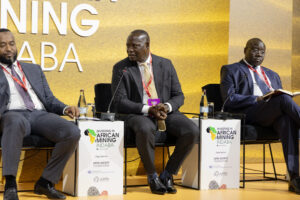
(Left-right) Charles Bradley, FOC Support Unit; Dr Albert Antwi-Boasiako, George Andah and Vincent Odotei Sowah (Deputy Ministers of Communications)
As part of measures to ensure that Ghana has a safe digital environment, a high powered delegation, comprising all stakeholders in the cyber security space, will be converging in Accra to discuss the most urgent challenges to the realisation of human rights online.
This has become necessary because there are a lot of barriers to overcome and safeguard the internet space for users.
Media launch
Speaking at a media launch ahead of the 8th Freedom Online Conference on Tuesday, the National Cybersecurity Advisor, Dr Albert Antwi-Boasiako, said that digital inclusion and accessibility will be the underlining issues to be discussed at the various sessions of the conference.
He added that it will provide the needed forum to re-examine the current and imminent challenges to freedom online.
“It will allow for the sharing of perspectives and identify possible solutions to these problems. With Ghana being the chair of the conference, particular focus will be given to the current state of digital rights across Africa,” Dr Antwi-Boasiako said.
Participation
The two-day conference is under the theme, “Achieving a Common Vision for Internet Freedom,” and is being held the Kofi Annan International Peace Keeping Training Centre, Accra.
About 300 participants, including government representatives and ambassadors, from about 40 countries are expected to attend. Among these participants are high-level dignitaries, including the ambassadors and high commissioners of the African region stationed in Ghana.
The thematic areas for the event will be digital inclusion, safeguarding elections in West Africa, the role of human rights in artificial intelligence, content moderation trends and challenges, child online protection, online misinformation and digital safety of human rights defenders.
Fake news
On cyber-security, he said the National Cybersecurity Centre is working to allay possible infractions in the cyber space ahead of the pools in December.
He said his outfit will, in the coming days, join forces with the media to promote awareness about fake news and electoral misinformation.
Sanitisation measures
In an interview with journalists after the briefing, a Deputy Communications Minister, Vincent Sowah Odotei, disclosed that the National Cybersecurity law is expected to be passed by the end of 2020 to sanitise Ghana’s internet space. He added that the draft bill is almost completed.
“Definitely, we expect that this year Ghana will have a cyber-security law, definitely. That’s our expectations,” Mr Odotei Sowah said.
According to him, the country already has some rules and regulations in place to ensure a safe digital space for all persons. However, he admitted, there are gaps which have to be addressed by the bill.
Responding to mechanisms being used to combat cybercrimes, in the absence of a cyber-security law, he noted that the country has an “Electronic Transactions Act, which criminalises certain actions, and one of the key benefits of the Budapest Convention is to train our prosecutors, police CID…our judges to ensure that we’re able to prosecute such things.”
“So, while we’re waiting for the National Cybersecurity law, there are certain provisions. We’re not totally bereft of laws, except that there are gaps which are not really up to date with the vast space of technology. So in the absence of that, we’re using sections of the Electronic Communication as the criminal code itself,” he added.
FOC
The Freedom Online Coalition (FOC) is a group of governments who have committed to work together to support internet freedom and protect fundamental human rights – free expression, association, assembly, and privacy online – worldwide.
The coalition was established in 2011 at the inaugural Freedom Online Conference in The Hague, the Netherlands, at the initiative of the Dutch Foreign Ministry. Today, the coalition has 30 members, spanning Africa through Asia, Europe, to the Americas and the Middle East.
All member states signed the FOC founding document (Freedom Online: Joint Action for Free Expression on the Internet) and committed to the principle that the human rights people have offline are the same online.








